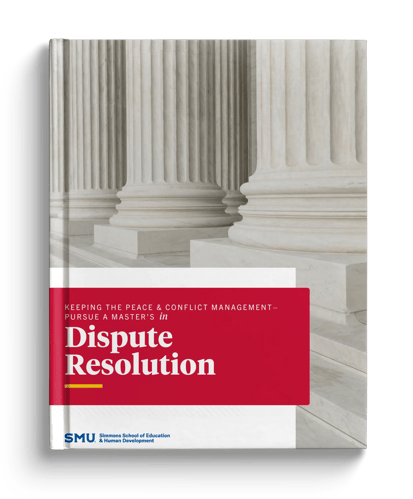
In an increasingly globalized world, the need for peaceful conflict resolutions is escalating. Tensions can rise for a number of reasons. Differences in ideologies, policies, and interests can lead to growing disputes between people and organizations. Issues like trade disputes, geopolitics, efforts against global warming, and even responding to global pandemics need quick, cohesive action to see real solutions.
With conflict being a common part of human interaction, the role of dispute resolution becomes essential in resolving these issues and forging pathways toward understanding and collaboration.
What is Dispute Resolution?
Dispute resolution is the practice of leading multiple parties toward peaceful solutions while involved in conflict or tension. Professionals in this field act as impartial participants, guiding conflicted parties toward common ground and mutual agreement. Sometimes, dispute resolution professionals are hired by one party or agreed upon by both parties.
Disputes are part of human interaction. When neither party can make progress because of growing tension, dispute resolution professionals step in with unique skills to overcome even the most complex problems. By guiding discussions towards understanding and compromise, we can resolve conflicts without resorting to more confrontational methods.
Jobs in Dispute Resolution
It's worth noting that dispute resolution skills are needed in nearly every field—from corporations to legal settings, education institutions, and even in handling international relations.
Dispute resolution skills are highly valued across a range of sectors, including:
- Corporate sector: Businesses of all sizes benefit from dispute resolution in managing business-to-business, customer, or employee conflicts.
- Legal sector: Law firms and courts often engage mediators or arbitrators as a method of alternative dispute resolution.
- Non-profit organizations: Non-profit organizations often face conflicts with donors, partners, or internal teams where dispute resolution can be vital.
- Government agencies: Dispute resolution professionals assist in conflict management and policy disagreements at various government agencies.
- Educational institutions: Schools and universities utilize dispute resolution to manage conflicts among staff, parents, and students.
Pursuing Careers in Dispute Resolution
Here's what you need to know about getting started in dispute resolution. Many people will find their way to dispute resolution inadvertently, but to overcome hurdles or see significant advancement, you’ll need formal training.
Master's programs in dispute resolution serve as doorways to this unique field. This academic program equips you with the theory and practice of managing conflicts, preparing you to guide others towards conflict resolution.
Getting your master’s in dispute resolution also gives you credibility. You’ll encounter a variety of people throughout your career in peacebuilding. With a master’s degree, you’ll have the credibility to back up your authority.
Spotlight on SMU’s Master's in Dispute Resolution
At Southern Methodist University's Simmons School of Education & Human Development, you'll find a master's in dispute resolution program combining academic rigor with practical experience.
The program provides the theoretical knowledge and practical skills you'll need to confront and resolve conflicts effectively. We innovate, inspire, and prepare our students to become leaders in change. Looking to dig deeper into your future in dispute resolution? We’ve got you covered.
Download our guide: Keeping the Peace & Conflict Management–Pursue a Master’s in Dispute Resolution. You’ll be able to explore what comes next in your peacekeeping mission and find the best path to a master’s program.


